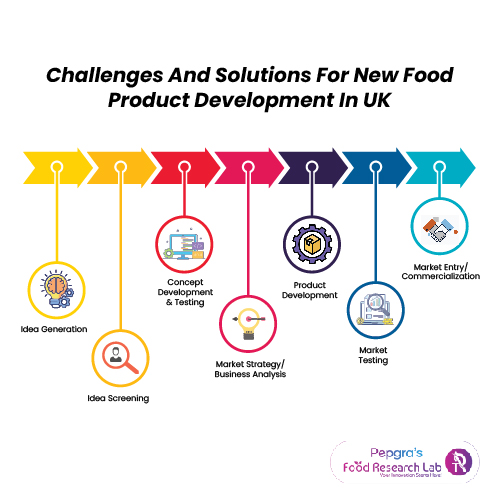
UK’s Food Product Development Issues and Solutions
Introduction:
In the UK, today’s food processing companies face an increasingly challenging market. Food product development risks and payoffs are higher and more unclear than in the past due to limited internal resources and finances, a rising need to get quickly to market, brand names whose value is being strained, and demanding purchasers. 2022 is expected to be a complex operating environment for UK food producers, with labour shortages and difficult price decisions among the challenges that will preoccupy firm leaders for most of the year.
Developing a new product line is both thrilling and challenging. Almost all firms make the same faults during the process of new product development. Understanding the food product development challenges can aid in prevention of time delays and keep your project on track on time.
Pain Point Identified: Add in a new Covid fear – the Omicron version – and ongoing post-Brexit commercial issues between the mainland UK and Northern Ireland, and it’s easy to see why there’s a general sense of doom. The food business is subject to turmoil in the economy, labour market, and supply chains by definition. A slew of New food product development challenges have surfaced in the UK this year, prompting some industry observers to refer to the conditions manufacturers are operating under as a perfect storm. This plethora of issues, if not addressed, will affect the manufacturers, especially in the new product development, adversely. Let’s look into each of the issues that surfaced in the layers of the UK’s industry:
a) Lack of skills and knowledge
With such big sums at risk, it is critical that businesses do all possible to assure success. However, creating a new food product or reformulating an existing one might be challenging. The improper heating technique, difficulty with an ingredient, or microbiological concerns can all have an influence on the safety and quality of a product. NPD necessitates specialized knowledge and skills in a variety of areas, including ingredients, safety assurance, thermal process validation, law, and packaging.
Suppose a corporation has to expand its facilities and build a new factory to create a new product. In that case, several other elements must be considered, such as the facility’s size, sanitary design, functional layout and work processes, and equipment specification. As a result, it’s not unexpected that particular food and beverage enterprises have restricted access to the necessary technological facilities and consulting expertise.
b) Product development delays
Product development delays might result in trailing time periods to match trends, resulting in a loss due to adaptability. Despite rising demand to create more new items and the need to speed up product development activities, the reasons for these delays are the poor definition of the product, technological uncertainties and Other managerial concerns that include management and organizational style, a lack of attention to detail, a lack of support for innovation, a lack of strategic thinking, and insufficient production facilities.

Solutions:
New food product development challenges might be technically demanding. A company, for example, has a challenge with a fermented product – maintaining the desired product viscosity during storage. This might be related to a variety of factors, including the management of the microbiological fermentation to get the desired levels of acidity, the addition of the appropriate volumes of the appropriate types of thickening agents, and temperature control to achieve the desired gelling. Solving the challenge necessitated research and understanding of the product’s microbiology, component formulation and interaction, and process control – all in order to achieve the ideal texture on which the product’s quality depended.
Enlisting the correct skills not only ensures a seamless transition from concept to product but may also save money by reducing waste and energy use. This is critical when profit margins are thin, as is the usual for the food and beverage industries. Unexpected difficulties can, of course, emerge in all areas of the food and beverage industry. Identifying the issue immediately and efficiently will save downtime and save money.
Conclusion:
Unexpected difficulties in new product development can occur, but to succeed, we have to foresee the changes in the market. The delay in new product development is still an issue for which clarity of the product and technological accessibility and uncertainties. The resolution of such issues with no further cost escalation needs proper planning and understanding of the product with skill and knowledge in the field.





